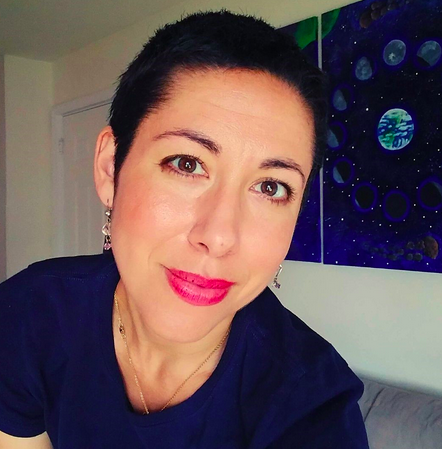Narrative Evaluation in Our MFA Program
A Personal Reflection by MFA Program Director, Nynke Passi
Narrative evaluation is an intuitive system of commenting on and grading a student's performance. It is particularly in sync with consciousness- and process-based education and far more nuanced than letter grading. It allows faculty to comment in detail, considering different criteria: achievement, strengths, professionalism, focus for growth, plus advice or considerations moving forward. Narrative evaluation gives students a holistic understanding of their performance.
Within the classroom, narrative evaluation stimulates emotional safety, curiosity, creativity, exploration, experimentation, and invention. There is safety to try and make mistakes, then try again in new ways, without fear of not checking a box or not earning the highest mark. This makes learning self-referral - a flow - instead of an effort to perform according to external expectations. In the creative arts, I've seen first-hand how this process-based grading leads to stronger, more intuitive, and more interesting work. It takes away fear of failing, falling short, or making mistakes. It opens the door to ground-breaking exploration. Students can be unguardedly bold.
Being allowed space for the messy parts of creative process and learning ("Write shitty first drafts," as writer Anne Lamott says) circumnavigates perfectionism and helps creativity thrive. It engages students with their learning material from within. It also ties in beautifully with self-evaluation, a self-referral feedback loop that allows students to deeply tap their own meta-cognitive processes. What tends to hold back creatives is their own un-explored, internalized blocks and fears, so having time to consider and work with those safely and at length as part of an MFA in creative writing is a boon that will help our students persevere and create successfully in the world. Using a narrative evaluation system allows for that kind of space.
This ability to know and be able to work with your own creative process - willingness to make mistakes, try, fail, try in a new way, experiment, create unguardedly, break boundaries, follow your own creative process from within instead of as a performance for others - is at the root of a healthy writing routine and a successful writing life. The system also mirrors the way work is approached out in the world. Editors or publishers don't tack grades on submissions but offer a narrative comment. In this sense, the system also prepares students for the working life of the writer.
A reflection by MFA student, Aliyah Warwick
The use of narrative evaluation in this MFA program has completely transformed my educational experience. It’s changed the way I produce creative work and positively affected my relationships with instructors and mentors. Rather than viewing my professors as authority figures to please, I now see them as supportive guides who are invested in my success and self-development. The narrative evaluation process gives me the autonomy to set and follow my individual creative goals while getting highly personalized feedback along the way. Rather than hustling for approval, I’m constantly checking in with myself to see if I’m meeting my expectations. For creative writing, narrative evaluation seems like the perfect fit because it allows us to focus on and refine our specific creative processes. Instead of being reduced to a number or letter grade, through the narrative evaluation process, I’m allowed to be a human and see my instructors as human too. Working with narrative evaluation has been empowering, liberating, and ultimately, has motivated me to do better work.
Program Learning Objectives
By the end of our MFA in Creative Writing, you, as a student, will be able to:
Create original work in a specific genre of emphasis that demonstrates both creativity and proficiency in craft and technique, including well-developed style and authentic voice.
Demonstrate dedication to both experimentation and revision during your immersive engagement with the writing process.
Internalize the philosophy of consciousness and explain its influence on your creative process.
Analyze and explain the varied influences of contemporary literature on your creative work.
Produce an online professional portfolio that demonstrates a wide array of professional knowledge.
Adapt your individual creative process from inspiration to completed work, resulting in the creation of a book-length manuscript of publishable quality.
Portfolio-Based Narrative Evaluation
MIU’s Online MFA in Creative Writing uses a unique portfolio-based narrative evaluation system that is more intuitively in sync with the writer’s creative process. Every class starts with course goals and ends with self-evaluation and a course portfolio. At the end of the program, students have gathered a program portfolio that showcases their best work. Students earn Pass or No Pass grades and receive a detailed evaluation of their performance from their faculty. This system of evaluation cultivates a meta-cognitive awareness of process and craft essential to the success of any working poet and writer.
Introduction & Rationale
Traditionally, the Master of Fine Arts is considered a terminal degree program. As such, and in deference to mounting evidence about traditional grading, MIU’s Online MFA in Creative Writing uses narrative evaluation and portfolio-based assessment to provide you with a more detailed and meaningful assessment of your work.
Narrative evaluation has several advantages. It removes many of the artificial and cumbersome requirements of traditional numeric and letter grading, which tend to incentivize conformity and concern with teacher expectations over authentic learning, creativity, and experimentation. Narrative evaluation also better reflects the professional practices in the field of creative writing, where editors and publishers do not grade writing but may engage with writers in narrative feedback if a response is warranted. One of the most important considerations in designing our program is the value of meta-cognition and reflection in the practice of writing. With detailed and individualized feedback from faculty, you are encouraged to grow your writing and writing process instead of simply receiving an arbitrary judgment.
Assessment of the Program Learning Objectives (PLOs) and course-level learning objectives relies upon three primary elements to ascertain and report upon student progress detailed in this plan:
Narrative Evaluation
Program Portfolio
Self-Evaluation
Narrative Evaluation
Courses in MIU’s Online MFA in Creative Writing use narrative evaluation instead of letter grades to assess your performance. Each narrative grade will be specific to the individual student, but the evaluations that constitute the student’s academic record will follow a consistent format that includes the following components: 1. Course Description and Learning Outcomes; 2. Achievement; 3. Professionalism; 4. Strengths; 5. Focus; 6. Moving Forward. Each narrative evaluation is around 250-300 words.
Following is a brief description of each component:
1. Course Description and Learning Outcomes
Each evaluation will begin with a brief description of the course and its learning outcomes. The description will likely be a version of the one in the syllabus and/or course catalog, and the learning outcomes should be the ones that appear on the syllabus. This section should be the same for every student in the course.
2. Achievement
The achievement section briefly discusses how well you demonstrated learning in relation to the objectives of the course.
3. Professionalism
In this context, professionalism refers to attendance, participation in discussion, cooperation with the course objectives, and punctual submission of quality work in adherence with the specified guidelines.
4. Strengths
Instructors will briefly describe your relative strengths, particularly in regard to fulfilling course objectives.
5. Focus
You will receive brief suggestions on areas to focus on in future coursework or writing development. Think of these as constructive suggestions for future improvement.
6. Moving Forward
The last component is a sort of catch-all category for advice, suggestions, suggested reading in an area of interest, etc. – anything the instructor feels would benefit you that has not already been mentioned in the evaluation.
Program Portfolio
You and the MFA faculty will maintain a cumulative portfolio of creative and scholarly work throughout the course of the program. At the end of each course, you will submit your work as part of a course portfolio, and your instructor will assess its quality and make the decision to accept your work or return it for further revision so it will meet the standards of the course. A selection of portfolio materials from each of your courses will be assembled in your program portfolio.
Self-Evaluation
Growth through reflection and meta-cognition is important to a writer’s practice to sustain development long-term, and it’s a powerful tool for learning. In self-evaluation essays, you will discusses your progress throughout a course: what you have learned, how you have used craft, what you have discovered about process, and how you wish to continue to grow. The self-evaluation essay will address questions such as:
What have you learned about your unique creative process?
What role did revision play in the creative and/or scholarly work you produced?
How does your understanding of consciousness help you to understand your process?
What knowledge or skills would help you and your writing continue to grow?
Your self-evaluation may also focus on (but is not limited to) some or all of the following:
What similarities and differences did you notice between your writing process during this course in comparison with your process in the past?
How did you use what you learned in the course in your writing?
How have you adjusted your process based on your awareness of your own strengths and areas for improvement as a writer?
If you could go back and do one thing differently during this course, what would you change and why?
Audience & Genre
Your audience for the self-evaluation essays is yourself and your faculty. Your faculty will read your response and consider it in your narrative grade, but since the self-evaluation is a reflective mode of writing, content is the most important part.
The reflection is an essay, but not a formal one. Outside sources should be cited using MLA style if you use them, but they are not required. There are no restrictions on form, format, usage, word choice, etc. so long as the writing demonstrates careful consideration of its purpose. Alternative or hybrid genre responses are acceptable so long as they communicate the key ideas to your audience. You can be creative with this task, but even that is not required.
"{W]riting [a book] is an excruciating process full of failure. But when a book succeeds, even partially, it represents a level of concentration and refinement—a mastery of subject and style strengthened through patience and clarified in revision—that cannot be equaled. Writing a book is an extraordinarily disproportionate act: What can be consumed in a matter of hours takes years to bring to fruition. That is its virtue. And the rare patience a book still demands of a reader—those precious slow hours of deep focus—is also a virtue."
- Thomas Chatterton Williams, from “The People Who Don’t Read Books,” The Atlantic











